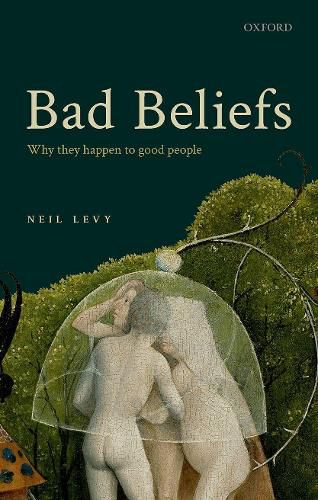Readings Newsletter
Become a Readings Member to make your shopping experience even easier.
Sign in or sign up for free!
You’re not far away from qualifying for FREE standard shipping within Australia
You’ve qualified for FREE standard shipping within Australia
The cart is loading…






This is an open access title available under the terms of a CC BY-NC-ND 4.0 International licence. It is free to read at Oxford Scholarship Online and offered as a free PDF download from OUP and selected open access locations.Bad beliefs - beliefs that blatantly conflict with easily available evidence - are common. Large minorities of people hold that vaccines are dangerous or accept bizarre conspiracy theories, for instance. The prevalence of bad beliefs may be politically and socially important, for instance blocking effective action on climate change. Explaining why people accept bad beliefs and what can be done to make them more responsive to evidence is therefore an important project. A common view is that bad beliefs are largely explained by widespread irrationality. This book argues that ordinary people are rational agents, and their beliefs are the result of their rational response to the evidence they’re presented with. We thought they were responding badly to evidence, because we focused on the first-order evidence alone: the evidence that directly bears on the truth of claims. We neglected the higher-order evidence, in particular evidence about who can be trusted and what sources are reliable. Once we recognize how ubiquitous higher-order evidence is, we can see that belief formation is by and large rational.The book argues that we should tackle bad belief by focusing as much on the higher-order evidence as the first-order evidence. The epistemic environment gives us higher-order evidence for beliefs, and we need to carefully manage that environment. The book argues that such management need not be paternalistic: once we recognize that managing the epistemic environment consists in management of evidence, we should recognize that such management is respectful of epistemic autonomy.
$9.00 standard shipping within Australia
FREE standard shipping within Australia for orders over $100.00
Express & International shipping calculated at checkout
This is an open access title available under the terms of a CC BY-NC-ND 4.0 International licence. It is free to read at Oxford Scholarship Online and offered as a free PDF download from OUP and selected open access locations.Bad beliefs - beliefs that blatantly conflict with easily available evidence - are common. Large minorities of people hold that vaccines are dangerous or accept bizarre conspiracy theories, for instance. The prevalence of bad beliefs may be politically and socially important, for instance blocking effective action on climate change. Explaining why people accept bad beliefs and what can be done to make them more responsive to evidence is therefore an important project. A common view is that bad beliefs are largely explained by widespread irrationality. This book argues that ordinary people are rational agents, and their beliefs are the result of their rational response to the evidence they’re presented with. We thought they were responding badly to evidence, because we focused on the first-order evidence alone: the evidence that directly bears on the truth of claims. We neglected the higher-order evidence, in particular evidence about who can be trusted and what sources are reliable. Once we recognize how ubiquitous higher-order evidence is, we can see that belief formation is by and large rational.The book argues that we should tackle bad belief by focusing as much on the higher-order evidence as the first-order evidence. The epistemic environment gives us higher-order evidence for beliefs, and we need to carefully manage that environment. The book argues that such management need not be paternalistic: once we recognize that managing the epistemic environment consists in management of evidence, we should recognize that such management is respectful of epistemic autonomy.